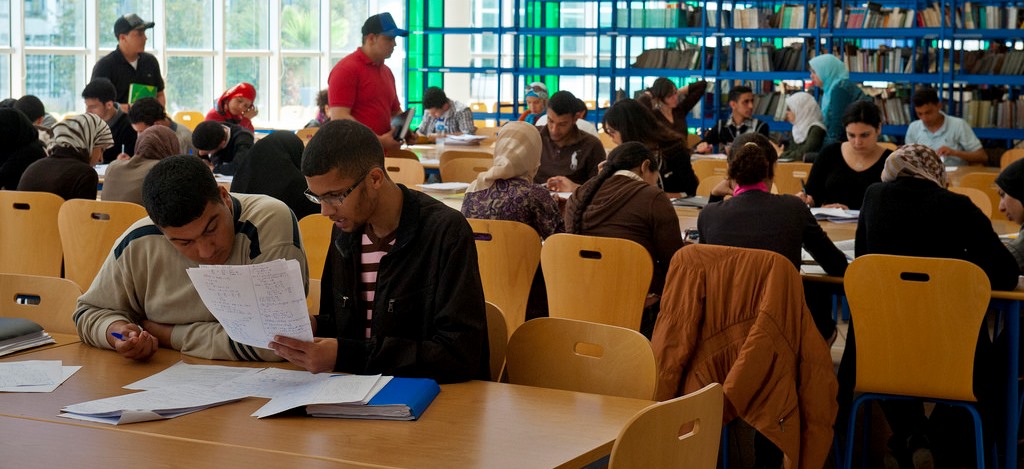Updated
Reforming Education: How Morocco Plans on Empowering the Next Generation – Anastasia Pestova
By Anastasia Pestova
September 23, 2015
August 20th, 2015 marked the 60th anniversary of the Revolution of the King and the People. In a speech on the occasion, King Mohammed VI called for comprehensive education reform in Morocco. Recognizing that the education sector has faced difficulties in the past, the King described the new system as one of fairness, equality of opportunity, and quality that will encourage individual and social progress.
Morocco has faced education challenges since its independence in 1956. Despite allocating 5.4% of its GNP to education, it still trails other developing countries in the region. A low level of public education does little to bridge the stark divide between a well educated elite and a third of all Moroccans who remain illiterate. National and international surveys have shown low attendance and high dropout rates, particularly past primary schools. This is especially true for rural areas, where inadequate roads and long distances separate students from schools. Educational institutions have also suffered from lack of qualified staff and of an updated, common curriculum for secondary students. The traditional linguistic divide between Berber and the official Arabic language has made it difficult to implement a universal curriculum. However, multiple endeavors, in the form of national polices, have been implemented to overcome these setbacks.
These include the National Literary and Non-formal Education Strategy established in 2004, an Accessibility and Infrastructure Reform in 2005, and an Education Emergency Plan in 2009. Recently, Morocco also launched an initiative to combat the problems of low attendance and literacy levels in rural areas by providing stipends to low income families, supplying bikes to the students in remote areas, and establishing other transportation services. Encouraging attendance in primary schools will hopefully lead to higher attendance in secondary schools and encourage students to pursue a career beyond their rural towns.
The Council of Education recently published the Strategic Vision for the Reform of the Moroccan School set to take place 2015-2030. This plan will address the setbacks mentioned above by basing education policy on three pillars. The first pillar, will create a school fairness and equality of opportunity, which will strive to ensure attendance and combat abandonment in all its forms including a reduction school dropout and repetition rates. This will be achieved by making schools in remote regions more accessible, creating common core examination levels for each grade, and teaching Arabic and French through secondary school, while also focusing on the Amazigh (a Berber) language. The government has also vowed to allocate resources to academic research and scholarships abroad for Moroccan students at the college level.
The second pillar requires a reform of business education and training. It includes training for teaching professionals and creating a new standard for those wishing to work in the educational sector. This is particularly relevant to private institutions, which can suffer from a lack of qualified staff, where a large percentage of the teachers do not possess a baccalaureate.
The third pillar will be based on securing employment for youth and human capital development by promoting marketable skills and vocational training. To accomplish this, Morocco aims to create programs that prepare students for the modern workforce by providing them with internships and necessary technical training.
The reforms emphasize education as a gateway to social and personal development, and the facilitation of a community dialogue that strengthens relationships between institutions and their communities. They aim to create fairness, equality of opportunity, and quality education for all. A reorganization of the educational system will also serve as a means to combat poverty, isolation, and fanaticism while meeting the demands of the 21st labor market at the same time. The King stressed that the “rehabilitation of education remains pivotal in achieving development and is key to ensuring social openness and emancipation.” His reforms advocate educational values stemming from tolerance and moderation. Since educational reform is a priority throughout the Middle East and North Africa, if Morocco succeeds, it will set an example for others to consider.
Anastasia Pestova is a research assistant at MAC.

Comments
Thank you for the blog, this is a very detailed description of the proposal/plan for education improvement in Morocco. The plan requires very intense efforts from the government, this is to mostly due to tremendous gaps in education levels and rural structure of the country. There is hope they will succeed (at least in some degree), since Morocco has stable political climate over years. -Thx